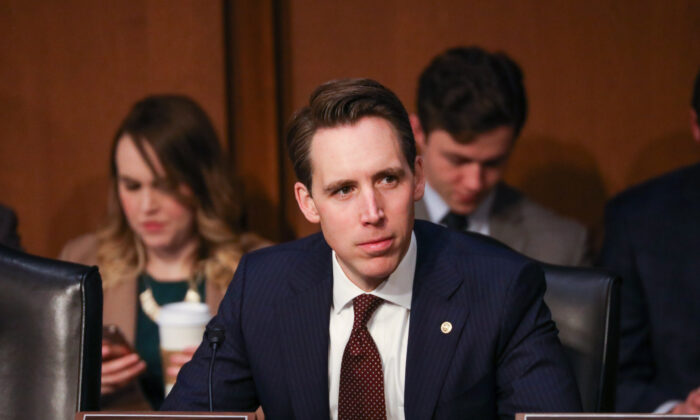BY
Sen. Josh Hawley (R-Mo.) wants Attorney General William Barr to investigate alleged violations by state and local officials of religious worshipers’ First Amendment right to assemble while allowing demonstrators protesting George Floyd’s death to gather without regard to public health measures imposed to curb the CCP virus.
“State officials have violated the free speech and free exercise rights of religious Americans by treating religious gatherings and speech differently than the speech and mass gatherings of protests,” Hawley told Barr in a June 9 letter.
“I urge you to launch a full civil rights investigation. As our Constitution allows, Americans have the right to peaceably protest. Millions of people are rightly angry about the death of George Floyd, and they should be able to protest peacefully.
“At the same time, state officials must not use their support for this protest to infringe the free exercise and free speech rights of religious Americans. Yet that is happening across the nation.”
Hawley’s request to Barr follows a controversial 5–4 Supreme Court decision on May 29 in which the majority upheld California’s restrictions on church gatherings as long as they were equally applied to other “non-essential” entities.
Chief Justice John Roberts wrote for the majority in defending broad state authority in public health matters.
“Where those broad limits are not exceeded, they should not be subject to second-guessing by an ‘unelected federal judiciary,’ which lacks the background, competence, and expertise to assess public health and is not accountable to the people.”
Justice Brett Kavanaugh dissented, saying, “What California needs is a compelling justification for distinguishing between (i) religious worship services and (ii) the litany of other secular businesses that are not subject to an occupancy cap. California has not shown such a justification.”
Kavanaugh also said: “Assuming all of the same precautions are taken, why can someone safely walk down a grocery store aisle but not a pew? And why can someone safely interact with a brave deliverywoman but not with a stoic minister?”
Hawley took note of the high court’s decision in his letter to Barr.
“The decision tilted in favor of the state, the Chief Justice wrote, because of uncertainty about whether the church was being treated worse than comparable secular organizations,” Hawley wrote.
“Now, after two weeks of nationwide protests, no uncertainty remains. Many jurisdictions across the nation are imposing extraordinarily strict caps on religious gatherings — such as restricting religious gatherings to 10 or fewer people — even as those jurisdictions allow thousands of people to gather closely in protests. States cannot allow one but prohibit the other.
“These actions also violate free speech. The First Amendment prohibits state officials from banning meetings based on the ideas that will be expressed. State officials have determined that the message behind the current protests is worth saying. But state officials cannot block religious speech while allowing protests simply because the states think the protest speech is more valuable.”
During a June 8 interview on Fox News, Barr said, “Why should some people who are enjoying their First Amendment rights by going out and protesting have broader rights than other people who may want to exercise, for example, their religious First Amendment rights and go to church, as long as social distancing rules and things like that are complied with?”
The Department of Justice warned California Gov. Gavin Newsom in a May 19 letter that his state’s CCP virus regulation on church gatherings “facially discriminates against religious exercise.”
Significant Differences
A June 8 survey by The Epoch Times of the 20 most populous U.S. cities and their states found some significant differences in how religious gatherings are treated.
Arizona, Florida, Ohio, and Texas appear to have the most liberal approach on the issue.
“Arizona has protected places of worship throughout COVID-19,” Patrick Ptak, a spokesman for Arizona Gov. Doug Ducey, told The Epoch Times. Phoenix is the fifth-largest U.S. city.
“They are constitutionally protected under the First Amendment and were never required to close, though many did out of an abundance of caution. Many are now opening back up, and our office has worked with public health officials to provide guidance,” he said.
Similarly, Texas allows religious gathering both inside and outside and without limitation on the number of participants.
“The Texas’ Governor’s guidelines for houses of worship were last updated May 26 and do not limit how many may worship; however, because we have continued to see record-setting new cases and deaths from COVID-19 in Dallas this month, people (especially those with high-risk members of their household) are still safest at home,” said Catherine Cuellar, a spokesman for Dallas Mayor Eric Johnson. Dallas is the ninth most-populous U.S. city.
By contrast, New York City Mayor Bill de Blasio has banned religious gatherings inside or outside, while suggesting the George Floyd protests are more important.
“When you see a nation, an entire nation simultaneously grappling with an extraordinary crisis seeded in 400 years of American racism, I’m sorry, that is not the same question as the understandably aggrieved store owner or the devout religious person who wants to go back to services,” he said June 3.
Jeremy Dys, special counsel for First Liberty Institute, said, “We hope Attorney General Barr asks mayors like Bill de Blasio, Jacob Frey [Minneapolis], and Muriel Bowser [Washington, D.C.] why they would join thousands in protests on their streets but prevent even the 12 disciples from meeting anywhere in their cities.”


Contact Mark Tapscott at [email protected]
Republished with Permission The Epoch Times SUBSCRIBE
Get Citizensjournal.us Headlines free SUBSCRIPTION. Keep us publishing – DONATE




